The UN Commission on Narcotic Drugs (CND) met in Vienna this week to draft a political declaration and plan of action to guide international drug policy for the next decade. While the prohibitionists prevailed in the end, the voices of dissent are growing ever louder and more powerful.
Ibogaine received concerted attention for its addiction treatment and other properties at a recent conference in Boston. Here's a report.
A US congresswoman from California suggested Thursday that it could be time for a marijuana legalization pilot program. Her home state would be an apt place to try it, she said.
From murder most foul to ripping off Crimestoppers, our corrupt cops run the gamut this week.
The New York Assembly passed a Rockefeller drug law reform bill last week. Now, the Senate has decided to submerge Rockefeller reform within a broader budget package in a bid to avoid having to take individual votes on it. Meanwhile, as if supporters needed any more ammunition for reform, another damning report is out this week.
The Obama administration has named Seattle Police Chief Gil Kerlikowske as the new drug czar... or is it Joe Biden?
Like the Grateful Dead before it, the jam band Phish has legions of loyal fans, many of whom enjoy their music with a little herbal or chemical alteration. It was a field day for cops as the band played a three-night show in Virginia.
Tenaha, Texas, lies between Houston and the casinos of Shreveport across the Louisiana line. The town thought it hit the jackpot with a sleazy policing scheme, but now it may be coming up snake eyes.
Marijuana prohibition doesn't achieve its stated goals, it costs a lot of money, and use levels would be similar under a relaxed regime, a pair of University of Washington researchers report.
The Minnesota medical marijuana bill has passed another pair of hurdles as it makes its way toward a hostile governor.
People suffering drug overdoses sometimes die because their companions either delay seeking medical assistance or fail to act at all for fear of getting arrested themselves. New Mexico has a law providing limited immunity for people in those circumstances. Now, a Washington legislator hopes to make his state the second to pass such a law.
Events and quotes of note from this week's drug policy events of years past.
"New Drug Czar Appointed, Makes Ridiculous Remark," "Ten Years Later, the United Nations Anti-Drug Efforts Have Accomplished Nothing," "NBC Insults Marijuana Users," "Propaganda Alert: Marijuana Makes You Bad at Video Games," "Are Republicans Turning Against the Drug War?," "Federal Prosecutors Seem Confused About Obama's Medical Marijuana Policy," "Why Are Democrats Barking About Rush Limbaugh's Drug Use?," "Police Officer in Cowboy Hat Talks Drug Legalization on Al Jazeera," "Drug Policy Reform Video and Poster Contest Winners Announced," "Contemplating Marijuana Legalization."
Apply for an internship at DRCNet and you could spend a semester fighting the good fight!
Students for Sensible Drug Policy (SSDP) is seeking a highly motivated, well-organized individual to help promote alternatives to the failed War on Drugs.
Do you read Drug War Chronicle? If so, we need your feedback to evaluate our work and make the case for Drug War Chronicle to funders. We need donations too.
The United Nations Commission on Narcotic Drugs (CND) met this week in Vienna to draft a political statement and plan of action to guide international drug policy for the next decade. The statement largely affirms existing prohibitionist policies and ignores harm reduction, as the CND has done it the past. [Editor's note: The draft statement had not been formally approved as of press time, but is likely to be approved as is.]
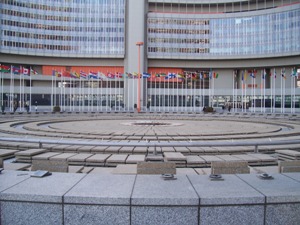
Vienna International Center, home of the UN Office on Drugs and Crime
The political statement is supposed to evaluate the implementation of the previous political declaration and action plan approved by the UN General Assembly Special Session (UNGASS) in 1998. At the 1998 session, UNGASS adopted the slogan "A Drug-Free World -- We Can Do It" and launched a "campaign" to wipe out all drug crops -- from marijuana to opium to coca -- by 2008.
But while the international community continues to slide down its century-old prohibitionist path regarding non-medicinal drug use and sales, it is encountering an increasing amount of friction. The United States, as leader of the hard-liners, continues to dominate the debates and set the agenda, but an emerging bloc of mainly Latin American and European countries is expressing deep reservations about continuing the same policies for another decade.
The atmosphere in Vienna this week was circus like, complete with street protests, as national delegations, non-governmental organizations (NGOs), and other interested parties heatedly debated what an increasingly vociferous minority called a "failed" approach to the issue. Debate was particularly intense about the inclusion of harm reduction in the political statement -- a position rejected by the US delegation, led by outgoing acting drug czar Edward Jurith.
The drug summit came as the UN, the CND, and the countries pushing the prohibitionist hard-line have come under repeated attack for essentially maintaining the status quo. On Tuesday, the European Commission issued a report that found while in the past decade policies to help drug users and go after drug traffickers have matured, there was little evidence to suggest that the global drug situation had improved.
"Broadly speaking the situation has improved a little in some of the richer countries, while for others it worsened, and for some of those it worsened sharply and substantially, among which are a few large developing or transitional countries," an EC media statement on the report said. "In other words, the world drugs problem seems to be more or less in the same state as in 1998: if anything, the situation has become more complex: prices for drugs in most Western countries have fallen since 1998 by as much as 10% to 30%, despite tougher sentencing of the sellers of e.g. cocaine and heroin in some of these markets."

SSDP's Kris Krane, caged as part of HCLU demonstration at UN (drogriporter.hu/en/demonstration)
Current anti-drug policies also came under attack from a growing coalition of NGOs, including Human Rights Watch, the International Harm Reduction Association, the European NGO Coalition for Just and Effective Drug Policies (ENCOD), and the International Drug Policy Consortium, as well as various NGOs from the US, Brazil, Canada, and England, among others, all of whom were in Vienna for the meeting. Human Rights Watch urged the CND to
undo a decade of neglect, while the English group Transform Drug Policy Foundation called for a
moratorium on global strategic drug policy setting, a review of the consequences of prohibitionist policies, and a commission to explore alternatives to the failed war on drugs.
"Every state that signs up to the political declaration at this commission recommits the UN to complicity in fighting a catastrophic war on drugs," said Danny Kushlick, policy director for Transform. "It is a tragic irony that the UN, so often renowned for peacekeeping, is being used to fight a war that brings untold misery to some of the most marginalized people on earth. 8,000 deaths in Mexico in recent years, the destabilization of Colombia and Afghanistan, continued corruption and instability in the Caribbean and West Africa are testament to the catastrophic impact of a drug control system based upon global prohibition. It is no surprise that the declaration is unlikely even to mention harm reduction, as it runs counter to the primary impact of the prevailing drug control system which, as the past ten years demonstrate, increases harm."
Not all the action took place in the conference hall. Wednesday saw a lively demonstration by NGO groups including Students for Sensible Drug Policy, the drug user group INPUD, ENCOD, and the Hungarian Civil Liberties Union, among others. Protestors spoke to reporters from jail-like cages, waved signs and passed out pamphlets to delegates forced to run their gauntlet, and decried the harms of drug prohibition. One particularly effective protestor was dressed as a sun-glass wearing, cigar-puffing Mafioso, celebrating that business was good thanks to prohibition.
Even UN Office on Drugs and Crime (UNODC) head Antonio Maria Costa, while whistling past the graveyard to insist that progress had been made in the past decade, acknowledged that current global policies have backfired in some ways. Giving the opening address Wednesday, Costa said "the world drug problem has been contained, but not solved" thanks to international anti-drug efforts.
But global drug control efforts have had "a dramatic unintended consequence," he added, "a criminal black market of staggering proportions." The international drug trade is "undermining security and development and causing some to make a dangerous wager in favor of legalization. Drugs are not harmful because they are controlled; they are controlled because they are harmful." Drug legalization would be "a historic mistake," he said.
Even so, Costa painted a dire picture of what prohibition had wrought: "When mafias can buy elections, candidates, political parties, in a word, power, the consequences can only be highly destabilizing" he said. "While ghettoes burn, West Africa is under attack, drug cartels threaten Central America and drug money penetrates bankrupt financial institutions".

activists from International Network of People Who Use Drugs (INPUD) at demo (drogriporter.hu/en/demonstration)
Not everybody was buying into the UNODC-CND-US position of more of the same. Bolivian President Evo Morales brandished a coca leaf, then chewed it during his address to the delegates to underline his demand that coca be removed from the list of proscribed substances.
"This is coca leaf, this is not cocaine; this is part and parcel of a culture," Morales said. The ban on coca was a "major historical mistake," he added. "It has no harmful impact, no harmful impact at all in its natural state. It causes no mental disturbances, it does not make people run mad, as some would have us believe, and it does not cause addiction."
Neighboring Brazil was also critical. "We ought to recognize the important progress achieved over the last decade," said Brazilian delegate Jorge Armando Felix. "But the achievements have not been accomplished. The aim of a world free of drugs has proven to be unobtainable and in fact has led to unintended consequences such as the increase of the prison population, increase in violence related to an illegal drug market, increase in homicide and violence among the young population with a dramatic impact on mortality and life expectancy -- social exclusion due to drug use and the emergence of synthetic drugs."
Felix also had some prescriptions for UNGASS and the CND. "At this historic moment with the opportunity to reassess the past 10 years and more importantly to think about the challenges to come, Brazil enforces the need for recognition of and moving towards: harm reduction strategies; assessing drug dependence, and HIV AIDS populations; securing the human rights of drug users; correcting the imbalance between investments in supply and demand reduction areas; increasing actions and programs of prevention based on scientific evidence with an emphasis towards vulnerable populations and towards increase of access to and care for problematic or vulnerable drug users; and to the acknowledgment of different models of treatment for the need for increased funding of these efforts."
Brazilian Luiz Paulo Guanabara, head of the NGO Psicotropicus, observed it all with mixed feelings. "Early on, I thought the NGO strategy for harm reduction would not result in anything and that we should aim for drug regulation instead," he said. "And in the end, the term harm reduction is not in the political declaration, but the Beyond 2008 document is very strong and has not gone unnoticed."
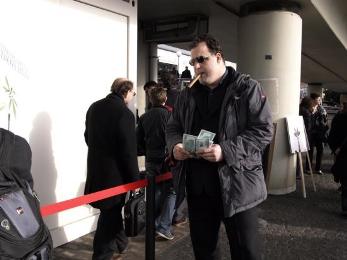
Mafioso-looking activist distributing ''United Nations of Prohibition'' 1,000 note bills with UNODC chief Costa's face on one side, and a thank you from the In Memoriam Al Capone Trust on the other (drogriporter.hu/en/demonstration)
Guanabara had harsh words for both the Americans and the UN. "It seems like the American delegates believe harm reduction is a sin -- or they favor harm increase, so they can lock up more people and have more HIV patients, increase crime, sell more weapons and make money out of the disgrace of others and families' destruction. Their prohibitionist stance is obscene," he declared. "And these guys at the CND understand nothing of drugs and drug use, they are just bureaucrats. To put drugs in the hands of bureaucrats is as dangerous as putting them in the hands of criminals."
But despite the lack of results this time around, Guanabara was thrilled by the participation of civil society. "The civil society mobilization is enormous and intense," he said. "The NGO events around the meeting were the real high-level meetings, not the low-level ones with the bureaucrats at the CND."
While the sentiments from Brazil and Bolivia were echoed by various national delegations, mainly European, and while even the UNODC and the US are willing to give nods to an increased emphasis on treatment and prevention, with the US delegation even going so far as to approve of needle exchanges, at the end of the day, the CND political declaration and action plan represents a stubborn adherence to the prohibitionist status quo.
"Government delegations could have used this process to take stock of what has failed in the last decade in drug-control efforts, and to craft a new international drug policy that reflects current realities and challenges," said Prof. Gerry Stimson, executive director of the International Harm Reduction Association. "Instead, they produced a declaration that is not only weak -- it actually undermines fundamental health and human rights obligations."
American attendee and long-time drug reform activist Michael Krawitz also had mixed feelings. "The slow train wreck that Harry Anslinger started with the 1961 Single Convention is finally grinding to a halt," he said. "The argument here has been a semantic one over harm reduction, but the subtext is much more important, and the subtext is that the treaties were set up to protect public health and are currently being interpreted in such a way as to do the opposite. The declaration wound up being watered down and piled high with reservations. The next five years should prove interesting."
The IHRA and other NGOs called on governments with reservations about the political declaration to refuse to endorse it. That probably will not happen, but some governments have indicated they will add reservations to their approval of the declaration. After a century of prohibition, the first formal cracks are beginning to appear at the center of the legal backbone of global drug prohibition. Given that the dissent has largely appeared only since the last UNGASS in 1998, perhaps this isn't such a bad start.
back to top
special to Drug War Chronicle by Doug Greene, assisted by Kevin Franciotti
On a cold and clear Presidents Day weekend, dozens of treatment professionals, underground providers, patients, researchers and entheogenic enthusiasts gathered at Boston's Northeastern University for the Boston Ibogaine Forum, the 2009 installment of the annual ibogaine conference, sponsored the Northeastern Students for Sensible Drug Policy (which is also hosting the Northeast SSDP Regional conference on April 3-5), the National AIDS Brigade, and Cures Not Wars.
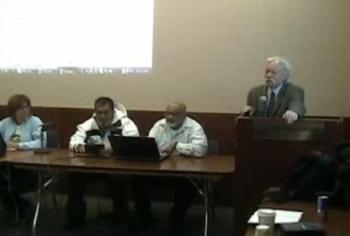
conference panel, Dana Beal at podium
is considered the 'active' compound in the
Tabernanthe iboga plant, used for centuries as a healer, teacher, and catalyst for ceremonies by the Bwiti people indigenous to what is now the Central-west African republic of Gabon. But the versatile plant has remained virtually unknown in the West, where it has a very different history.
Researcher Howard Lotsof, PhD, addicted to heroin and methadone, discovered the anti-addictive action of ibogaine in 1962. Given a capsule of pure ibogaine HCL by a trusted friend who was familiar with chemistry, Lotsof was simply seeking a new high. He was astonished when coming out of this difficult experience 36-opiate-abstinent hours later to realize he had no physical craving for opiates, and even more remarkably, had experienced very little of the agonizing physical symptoms normally associated with opiate withdrawal.
Although other early research was undertaken in the 1960s, ibogaine's eventual acceptance as anti-addiction agent in the West was tied to Lotsof's remarkable personal story. Off opiates, Lotsof turned with enthusiasm toward ibogaine and other psychedelics, running trials in the mid-1960s before going to prison under new federal drug laws banning the psychedelics at the end of the decade. For another two decades, Lotsof and ibogaine as addiction treatment wandered in the wilderness, his research supported by groups such as Cures Not Wars.
It was only in 1989 that Lotsof made significant contacts with mainstream researchers, who undertook their own pioneering researches. In the years between then and now, thanks to the missionary efforts of Lotsof and his supporters, ibogaine has ever so slowly become of greater and greater interest to addiction researchers and others.
Valentine's Day morning found ibogaine aficionados at the movies for Facing the Habit, a 2007 film featuring heroin users who succeed -- or fail -- to kick their habit through ibogaine treatments. Next up was ibogaine's most prominent advocate, the mustachioed Cures not Wars co-founder and Yippie! Dana Beal, who brought conference attendees up to speed on the latest research on ibogaine's anti-addictive properties, including its ability to regenerate dopamine pathways in the brain through its activation of glial cell line-derived neurotrophic factor GDNF. This exciting research had a panel of its own later in the day featuring Roman Paskulin, founder and director of Slovenia's Open Mind Institute and Dr. Tracy Blevins.
Beal was followed by a panel of ibogaine treatment providers discussing the special safety challenges involved in treating multiple addictions to different drugs, including Drs. Anwar Jeewa and A.R. Gani, of the groundbreaking residential treatment center Minds Alive in Durban, South Africa, Dr. Bruno Rasmussin of Brazil, and long-time provider Rocky Caravelli.
Next up was one of the most interesting presentations of the conference, by Justin Kirkland, Vice President of Sales and Marketing for Obiter Research on the company's efforts to develop more cost-effective methods of synthesizing 18 Methoxycorinaridine 18-MC, an ibogaine analog with fewer side effects and greater potential for treating methamphetamine and nicotine dependence. The day's events closed with McLean Hospital's Dr. Carl Anderson discussing ibogaine, dream states and fetal R.E.M.
Sunday started with another ibogaine documentary, the Dutch Rites of Passage, followed by SSDP Northeastern's Arielle Torra presenting on the subjective experiences of patients treated at Dr. Deborah Mash's Healing Transitions Institute for Addiction clinic on St. Kitts.
The first scheduled panel of the day addressed the controversial use of ibogaine for other indications, including hepatitis C (HCV). Former New Mexico Department of Health Harm Reduction Coordinator Phillip Fiuty and Rocky Caravelli confirmed the existence of HCV patients whose conditions have improved and even cleared the virus without interferon treatment. Caravelli also described positive effects on herpes, MS and asthma. Jason Farrell, founder and former executive director of Positive Health Project and currently CEO of Harm Reduction Consulting Services, Inc., suggested a collaborative study by clinics in South Africa, Mexico and Brazil tracking the viral loads of HIV/HCV patients for six months to a year.
Next, former High Times and drugwar.com writer and editor Preston Peet gave dramatic personal testimony on ibogaine's efficacy in managing chronic pain by drastically cutting opioid tolerance.
The liveliest panel of the conference came up next, featuring Patrick Kroupa -- a pioneer hacker and long-time activist whose multiple roles include High Priest of the Sacrament of Transition, an Eastern European based iboga religion -- Dr. Deborah Mash, Peet, and Lenny of the New York City ibogaine support group comparing ibogaine to more conventional treatments, such as 12-step cold turkey, methadone taper, buprenorphine and ultra-rapid opiate detox (UROD). UROD -- the direct injection of the opiate blocker naltrexone under benzodiazepine sedation -- was denounced by all panelists as ineffective and inhumane.
The next panel, comparing the anti-addictive effects of ibogaine to other entheogens, featured Harvard Assistant Professor of Psychiatry John H. Halpern and Jon Harrison, the principal investigator for the Multidisciplinary Association for Psychedelic Studies ibogaine outcome study at Pangea Biomedics in Playas de Tijuana, Mexico. Halpern compared ibogaine's effectiveness to other entheogens sometimes given as treatment modalities for drug addiction, most notably peyote use in the possible treatment of alcoholism among the Native American population, and the sacramental use of ayahuasca among American members of the Santo Daime and UDV churches.
This observational case study is examining changes in substance use in 30 individuals seeking ibogaine-based addiction treatment, and is intended to gather information to evaluate whether ibogaine-assisted therapy helps opiate-dependent people stop using opiates or practice moderated use after the therapy. Twelve-month follow-up data is being collected from participants in the study to examine whether ibogaine-assisted therapy facilitates improvements in quality of life that result in decreased harms associated with chronic or mismanaged opiate use. The study has received Institutional Review Board approval from the California Institute of Integral Studies and has enrolled 11 of the 30 subjects. For many months, MAPS had no success in raising funds for the study, but received its first significant donation at the conference, and by March 2nd, had raised all the funds for the study.
Halpern, who's published some of the only research on peyote use by Native Americans, surprised the crowd by revealing that the National Institute on Drug Abuse had so constrained his research that he wasn't allowed to directly study peyote's manifest anti-addictive effects. He also had no data on receptor-mediated anti-addictive effects, ascribing it all to "psychedelic glow."
Sunday's program closed with Makky, Boston University Professor of Classical Studies Carl Ruck and Beal discussing shamanic scenes in South America vs. Africa, a possible iboga role in the ancient world, and the dangers of "The Mushroom and the Cross" approach offending fundamentalists, respectively.
Presidents Day opened with a roundup of the international ibogaine scene. Venezuelan Drs. Rosaria Dávalos and Zulema Medrano described great progress in promoting ibogaine treatments, but also obstacles due to continued deference to the US. Drs. Jeewa and Gani gave details on their residential treatment center. Australian treatment provider Jason Chamon described a smaller, informal treatment scene -- clandestine in Australia, legal in New Zealand. De Loenen finished up, appearing live via Skype to contrast the more relaxed attitudes in Spain and Portugal with a forum in Holland on arrhythmia in ibogaine patients.
The international ibogainesters were followed by a panel on ibogaine's role in harm reduction, featuring Jason Farrell, Phil Fiuty and Cures not Wars cofounder and veteran drug policy activist Doug Greene. Farrell stressed the need for ibogaine treatment providers to be careful about whom they treat to minimize risks, citing a recent case in Netherlands where a patient refused to stop alcohol use before a treatment and had a seizure and then two days of arrythmia. At the same time, he urged greater availability of ibogaine treatment, advising potential providers to get a space and cots and "just do it." Greene praised ibogaine as the most libertarian option for drug treatment, and called on the drug policy reform movement to center its efforts on marijuana and ibogaine.
The conference closed with a panel that included the National AIDS Brigade's Jon Stuen-Parker discussing his lawsuit against the federal government for inattention to crack and heroin. MAPS founder and President Rick Doblin then gave the attendees a road map to promote ibogaine to state and federal policymakers, while Dana Beal suggested a letter from members of Congress to President Obama's forthcoming DEA Administrator.
This was the first ibogaine conference to be streamed live on the Internet, with twice as many people often logged-on as were in the room. Although speakers and attendees alike were frustrated by the conference's uneven pacing and complete disregard of the announced, reaction to the content of the conference was generally positive. Jason Farrell said: "It was a very impressive conference that opened my eyes to the serious, international work that's being done on ibogaine. It's unfortunate that it didn't get the news coverage it deserved."
Long-time drug policy reform activist Valerie Vande Panne said: "It's good to see ibogaine getting the research and recognition it deserves. Clearly, it has been beneficial in a holistic, dignified, and humane way to the lives of many who considered themselves addicts ready for a life change."
Rick Doblin said: "Many of the speakers were fascinating and had lots of experience and important information to share, and the future of ibogaine is bright. The clinics are moving toward more of an above-ground, responsible medical model and are realizing the importance of aftercare programs. I'm not sure where resources would come from for clinical studies to make ibogaine legal in the US -- that may be a stretch too far for NIDA, even under Obama. While I don't see commercial drug development happening in the near term in the US, or anywhere else, there will be more prospective research at the clinics which will, over time, build support for more clinical studies."
Streaming video of the conference can be found here.
back to top
US Rep. Loretta Sanchez (D-CA) suggested Thursday that the time may be right for a "pilot program" of marijuana regulation. The congresswoman's comments came as she was interviewed live on CNN to discuss a congressional hearing on the prohibition-related violence taking place in Mexico. Sanchez is chair of the House Homeland Security Committee Subcommittee on Border, Maritime, and Global Counterterrorism.

Loretta Sanchez
Citing a recent
Zogby poll commissioned by NORML that found majority support for taxed and regulated marijuana use and sales on the West Coast, Sanchez was responding to her host's question about the whole notion of drug legalization. California's receptiveness toward less restrictive marijuana laws would make it a good place to experiment, she said.
"Well, certainly, I have seen in my own state of California people over and over voting a big majority the whole issue of marijuana and possession of that," Sanchez said. "So maybe it would be a good pilot program to see how that regulation of marijuana might happen in California since the populace, the majority of Californians believe maybe that should happen."
Sanchez compared marijuana prohibition to the prohibition of alcohol in the 1920s. "Well, certainly there is one drug -- it's called alcohol -- that we prohibited in the United States and had such a problem with as far as underground economy and cartels of that sort that we ended up actually regulating it and taxing it," she said. "And so there has always been this thought that maybe if we do that with drugs, it would lower the profits in it and make some of this go away."
Sanchez's comments came two weeks after California state Assemblyman Tom Ammiano (D-San Francisco) introduced the first marijuana legalization bill in state history and one week after the Obama administration announced it would no longer persecute medical marijuana providers in the state.
With staunch Republican anti-prohibitionist Rep. Ron Paul and liberal Democrat and federal decriminalization bill author Rep. Barney Frank as possible strange bedfellow allies, the question now becomes: Is it time for a marijuana legalization caucus in the House of Representatives?
back to top
From murder most foul to ripping off Crimestoppers, our corrupt cops run the gamut this week. Let's get to it:

evidence locker
In New York City,
a former NYPD narc who resigned last year in the face of corruption charges was arrested Monday in the shooting death of his ex-girlfriend. Former officer Jerry Bowens, 43, was one of five officers arrested last year in a scandal in which they were accused of taking drugs and cash they had seized and using it to pay a confidential informant. After those arrests, the Brooklyn District Attorney's Office dismissed charges or vacated convictions in 183 cases involving those officers. That investigation is continuing, but probably now means little to Bowens, who is facing a murder charge.
In Philadelphia, a jailed former Philadelphia police officer was charged March 3 with plotting from his jail cell to assault two suspected drug dealers he believed were cooperating with authorities against him. Former officer Malik Snell is in federal detention awaiting retrial on charges he participated in an attempted robbery of a drug house and ripped off other drug dealers. He is now accused of threatening "to inflict bodily injury" on the two men he suspected were government witnesses. He also is accused of stealing $40,000 in cash at gunpoint from one of the men.
In Vivian, Louisiana, a Vivian police officer was arrested last Friday on charges he bought a stolen gun on the street and sold it back to a drug dealer when he found out it was stolen. Officer James Arthur, 34, went down after one of four rifles reported stolen in nearby Shreveport in March 2008 turned up in a drug raid in November. The Caddo Parish Sheriff's Department investigated and found out that Arthur had bought the gun, a Bushmaster XM15 assault rifle worth $1,250, for $300 on the street, but had then resold it to a "known drug dealer" after checking a national firearms registry and seeing it listed as stolen.
In Erie, Pennsylvania, a former Erie police lieutenant was sentenced March 4 for repeatedly stealing cocaine from the department evidence locker. Robert Liebel, 47, had pleaded guilty in January to nine misdemeanors for the 2007 and 2008 thefts. He was sentenced to at least 77 days in prison and between nine and 22 months on house arrest, plus three years probation. Liebel admitted stealing the coke for his personal use.
In Lebanon, Ohio, a Warren Correctional Institution guard was charged March 5 with trying to sneak 200 grams of marijuana into the prison. Guard Stephen Howard, 49, was arrested two days earlier after being caught trying to smuggle the dope inside hollowed-out markers and a Subway sandwich. He faces charges of attempting to convey drugs onto the grounds of a detention facility and possession of criminal tools, both felonies.
In Jacksonville, Florida, a Jacksonville Police narcotics detective was fired Wednesday over his role in a Crimestoppers hot-line scam. Detective James Narcise was accused of providing inside information on the location of criminals to a female friend, who would then use it to collect the reward money. The department apparently took that offense more seriously than his fatal shooting of an 80-year-old man during a drug sting in 2007. He was cleared of any wrongdoing in that case.
back to top
The New York Assembly passed a Rockefeller drug law reform bill last Wednesday, with the state Senate expected to take action shortly. But last Friday, the Senate's Democratic leaders decided to fold their version of the bill into their larger budget proposals, which will be taken up later this month.

June 2003 ''Countdown to Fairness'' rally against the Rockefeller drug laws, NYC (courtesy 15yearstolife.com)
According to the
Albany Times-Union, Senate Democrats, who control the chamber by a margin of 32 to 30, want to avoid being tagged as "soft on crime" by their Republican counterparts. With the Senate version of the Rockefeller reform bill submerged within the broader budget bills, senators will not have to actually stand up and vote for the reforms, just for the overall budget package.
"Our position is these bills should be taken up on the merits and not folded into a budget bill," said Senate Republican spokesman Scott Reif, whose party would like to see Democrats forced to vote for "freeing drug dealers."
"It's clear that it's as much of a budget issue as it is a sentencing issue," said Senate Democratic spokesman Austin Shafran, noting that imprisoning people or subjecting them to drug treatment both have financial costs. He denied that Democrats took this route because they lacked the votes to pass Rockefeller reform on its own.
While the politicians in Albany are dancing around each other, yet another report has been released demonstrating the disastrous impact more than three decades of Rockefeller drug laws has had on the state. The report, "Rockefeller Drug Laws: Unjust, Irrational, Ineffective," was produced by the New York Civil Liberties Union and examines the economic and social impact of the Rockefeller laws on the state as a whole and on its largest cities: Albany, Buffalo, New York City, Rochester and Syracuse.
In a demographic analysis of who is sent to prison and for what in New York, the report found huge racial and geographic disparities. In New York City, for example, neighborhoods with just 4% of the city's adult population accounted for 25% of those sent to prison. More than half of those sent up the river went on drug charges, and 97% were non-white. Similar numbers come in for other big Empire State cities.
"New York's drug sentencing laws are the Jim Crow laws of the 21st Century," said Robert Perry, NYCLU legislative director and the report's lead author. "Prosecution of drug offenses has sent hundreds of thousands to prison, most of whom were charged with low-level, nonviolent offenses. The Rockefeller drug laws have been a driving force in incarcerating a prison population that is almost exclusively black and brown."
"The Rockefeller drug laws have failed by every measure. They tear apart families, waste tax dollars and create shocking racial disparities," said Donna Lieberman, NYCLU executive director. "Yet, after 36 years of failure, our state continues locking up the wrong people for the wrong reasons. Justice and common sense require comprehensive reform."
The report makes several recommendations for reform, including:
- Reduce sentences for those convicted of drug-related crimes.
- Restore judicial discretion and end mandatory minimum sentences for drug offenses.
- Develop and invest in a statewide alternative to incarceration model to provide supervised treatment, education and employment training for those who would be better served by diversion than by prison.
- Provide retroactive sentencing relief for those already incarcerated under the Rockefeller drug laws.
"Faced with a major recession and a multi-billion dollar budget deficit, New York cannot afford to waste hundreds of millions of dollars locking up nonviolent drug offenders," Lieberman said. "Money saved through reforming the drug-sentencing laws could be spent helping struggling New Yorkers get back on their feet."
The Assembly has done its duty. Now it is up to the state Senate and Gov. David Patterson (D) to come up with a real reform bill at least as good as the Assembly's.
back to top
At a Wednesday press conference, Vice President Joe Biden announced that President Obama will nominate Seattle Police Chief Gil Kerlikowske as the next head of the Office of National Drug Control Policy (ONDCP), also known as the drug czar's office. But unlike his immediate predecessor, John Walters, Kerlikowske will not get a seat on the Cabinet.
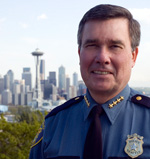
Gil Kerlikowske
"Gil Kerlikowske is recognized both nationally and internationally for his innovative leadership and law enforcement solutions. He brings a lifetime of experience working on drug policy issues. He has worked on the issue at all levels -- from the Department of Justice to the front lines as a major city chief. He understands that combating drugs requires a comprehensive approach that includes enforcement, prevention and treatment," said Vice President Biden.
Kerlikowske has been police chief in Seattle since 2000 and is currently head of the Major Cities Chiefs Association, representing 56 of the largest police forces in the country. He also served as Police Commissioner for the City of Buffalo, where he served until 1998, when he left to become the Deputy Director of the COPS program for the Department of Justice.
"The success of our efforts to reduce the flow of drugs is largely dependent on our ability to reduce demand for them," Kerlikowske said at the ceremony top-heavy with police brass. "Our nation's drug problem is one of human suffering, and as a police officer but also in my own family, I have experienced the effects that drugs can have."
But Kerlikowske will not sit on the Cabinet; the drug czar position was demoted by the incoming Obama administration, perhaps in order to give Vice President Biden, a long-time congressional drug fighter, a greater role in determining national drug policy, the Washington Post suggested, citing "administration sources."
Although Biden and Obama have said repeatedly that they believe in drug courts and drug treatment over incarceration, Biden could not help slipping into vintage drug warrior mode, replete with every hackneyed cliche in the book. "Addiction is a disease," he said. "The correlation between drugs and violence is well-established," he added. Biden also seemed unable to say the words "drug use," instead only mentioning "drug abuse."
And while Biden said the country needed a "comprehensive answer" to drug use and spoke of treatment, prevention, and law enforcement, he did not mention harm reduction programs. "We know we needed tough laws, and we have tough laws. But that wasn't enough. We needed a balanced approach in combating drugs -- one that included prevention, treatment and enforcement."
One would almost think it was Biden, not Kerlikowske, who had just been nominated as drug czar. Given the demotion from the Cabinet of the new drug czar, will it be Biden more than Kerlikowske calling the policy shots?
back to top
The jam band Phish played a three-night show at the Hampton Coliseum in Hampton, Virginia, over the weekend -- their first appearance anywhere in five years -- but it was just like old times as local police and a surprising array of other law enforcement agencies arrested at least 267 people on drug charges and seized a reported $1.2 million worth of drugs. Hampton police reported 194 arrests, while police in neighboring Newport News reported 73 more.
Hampton police reported 81 felony arrests resulting in 119 charges and 113 misdemeanor arrests resulting in 126 charges. Newport News police didn't provide a breakdown of arrests, but said most resulted from operations targeting fans staying at local motels and hotels. The Newport News operation came "in anticipation of increased violations" of state drug laws, the department said, and a "majority of those arrested were Phish concert attendees."
Hampton police reported seizing marijuana, cocaine, heroin, Ecstasy, and various prescription drugs, as well as $68,000 cash. Newport News police reported seizing 17 grams of cocaine, 369 grams of marijuana, and small amounts of hashish, mushrooms, methamphetamine, Ecstasy, and OxyContin.
Big bust numbers at Phish Shows in the Hampton Roads are nothing new. When the band played Virginia Beach in 1998, police arrested 136 people, and when the band returned for a one-night show at the Coliseum in 2004, 100 people got busted.
The concerts drew about 17,000 people each night, and with such a target-rich environment, local police called their colleagues to get in on the action. In addition to Hampton, Poquoson, and Newport News police, other agencies working the show included the Hampton Sheriff's Office, the Virginia State Police, the Virginia Alcoholic Beverage Commission, the DEA, the Naval Criminal Investigative Service, the Army's Criminal Investigations Division, and the Air Force's Office of Special Investigations.
Substance using or peddling Phish fans: You're not paranoid. They are after you.
back to top
Police in small town Tenaha, Texas, near the Louisiana line, have found a way of turning law enforcement into a lucrative racket. According to a recently filed federal lawsuit, police there routinely stopped passing motorists -- the vast majority of them black -- and threatened them with felony arrests on charges such as money laundering unless they agreed to sign over their property on the spot.
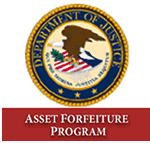
teaching evil: US Dept. of Justice assets forfeiture program logo
More than 140 people accepted that Hobson's choice between June 2006 and June 2008, according to court records cited by the
Chicago Tribune, which ran a lengthy article on the practice this week. Among them was a black grandmother who handed over $4,000 in cash and an interracial couple from Houston who handed over $6,000 in cash after police threatened to arrest them and send their children to foster care. Neither the couple nor the grandmother were charged with any crime.
The waiver form that the couple signed giving up their rights is particularly chilling. "We agree that this case may be taken up and considered by the Court without further notice to us during this proceeding. In exchange for this agreement, no criminal charges shall be filed on either of us as a result of this case, and our children shall not be turned over to CPS."
Officials in Tenaha, which sits on a heavily traveled highway between Houston and popular gambling destinations in Louisiana, said they were fighting drug trafficking and were operating in accord with state asset forfeiture law, which allows local police agencies to keep drug money and other goods used in the commission of a crime.
"We try to enforce the law here," said George Bowers, mayor of the town of 1,046 residents, where boarded-up businesses outnumber open ones and City Hall sports a broken window. "We're not doing this to raise money. That's all I'm going to say at this point," he told the Tribune.
But civil rights attorneys said what Tenaha was doing amounted to highway robbery and filed a federal class action law suit to halt the practice. Tenaha officials "have developed an illegal 'stop and seize' practice of targeting, stopping, detaining, searching and often seizing property from apparently non-white citizens and those traveling with non-white citizens," according to the lawsuit, which was filed in US District Court in the Eastern District of Texas.
One of the attorneys involved, David Guillory of Nacogdoches, told the Tribune he combed through county court records and found nearly 200 cases where Tenaha police had seized cash and property from motorists. In only 50 of those cases were drug charges filed. But that didn't stop police from seizing cash, jewelry, cell phones, and even cars from motorists not found with contraband or charged with any crime.
The practice was so routine in Tenaha that Guillory was able to find pre-signed and pre-notarized police affidavits, lacking only the description of the "contraband" to be seized.
"The whole thing is disproportionately targeted toward minorities, particularly African-Americans," Guillory said. "None of these people have been charged with a crime, none were engaged in anything that looked criminal. The sole factor is that they had something that looked valuable."
It's not just Tenaha, and it's not just blacks. Hispanics in Texas allege they are the victims of discriminatory highway stops and seizures, too. The practice is especially prevalent on the handful of US highways heading south from the I-10 corridor toward Mexico.
One prominent state legislator, Sen. John Whitmire, chair of the Senate Criminal Justice Committee, said police across the state are increasingly relying on seizures to fund their operating budgets. "If used properly, it's a good law-enforcement tool to see that crime doesn't pay," said Whitmire. "But in this instance, where people are being pulled over and their property is taken with no charges filed and no convictions, I think that's theft."
Whitmire said the problem extends beyond Tenaha, and he's going to do something about it. On Monday, he filed a bill that would require police to go before a judge before attempting to seize property under the asset forfeiture laws. Ultimately, he said, he is looking for a law that allows police to seize property only after a suspect is charged and convicted in court.
"The law has gotten away from what was intended, which was to take the profits of a bad guy's crime spree and use it for additional crime-fighting," Whitmire said. "Now it's largely being used to pay police salaries -- and it's being abused because you don't even have to be a bad guy to lose your property."
back to top
Marijuana prohibition has not achieved its goals, but has inflicted significant costs on society and individuals, a pair of University of Washington researchers concluded in a report released last week. And all for naught, they suggest, because decriminalizing pot or deprioritizing marijuana law enforcement does not appear to lead to higher levels of marijuana use.

marijuana plants (photo from US Fish and Wildlife Service via Wikimedia)
The report,
The Consequences and Costs of Marijuana Prohibition, was written by sociologist Katherine Beckett and geographer Steve Herbert, both associate professors in the University of Washington's Law, Societies, and Justice Program. Using data analysis and in-depth interviews, they compared the fiscal, public safety, and human costs of marijuana prohibition.
The scholarly duo found that the domestic portion of the federal drug control budget more than doubled in the 1990s, to more than $9.5 billion in 2001, with marijuana arrests accounting for nearly all the increase in drug arrests in that decade. With some 28,000 people imprisoned on marijuana charges in state or federal prison, that's an additional $600 million a year in incarceration costs borne by state and federal governments.
Despite the spike in marijuana arrests in recent years -- now more than 800,000 a year -- marijuana prohibition has signally failed to produce the desired results. Instead, the researchers found, the price of pot has dropped, the average potency has increased, as has availability, and use rates have often increased despite escalating enforcement.
"The report finds that the 'war on marijuana' is quite costly in both financial and human terms, and the prohibition of marijuana has not measurably reduced its use. This is a clear call for us to reconsider our laws and policies on marijuana," said Alison Holcomb, ACLU of Washington drug policy director.
What does not cause marijuana use rates to increase, said the researchers, are reformist policies. Areas that have decriminalized simple possession, deprioritized marijuana law enforcement, or that allow for medical marijuana have not seen increases in use rates, they found.
back to top
The Minnesota medical marijuana bill has survived a third state Senate committee vote and won its first House vote. The Senate Health and Human Services Budget Division passed the measure Tuesday on a divided voice vote. The following day, the House version of the bill passed the House Civil Justice Committee on a voice vote with no dissenting votes.

Minnesota State Capitol
The bill,
SF 97, would allow qualified patients or their caregivers to possess up to 2 1/2 ounces of usable marijuana and 12 plants. People suffering from cancer, glaucoma, AIDS, Hep C, or Tourette's Syndrome or a chronic or debilitating disease or its treatment that produces wasting syndrome, intractable pain, severe nausea, seizures, or spasms whose doctors approve of their use would qualify.
A previous version of the bill passed the Senate and every House committee vote during the 2007-2008 session, but died without a House floor vote. It faced the strong opposition of law enforcement and a veto threat from Republican Gov. Tim Pawlenty. Pawlenty's position has not changed, but bill supporters are hoping it will.
"I am increasingly confident that this will be the year that Minnesota joins the 13 other states that have acted to protect medical marijuana patients from arrest," said bill sponsor Sen. Steve Murphy (DFL-Red Wing). "This is an issue where science, compassion and simple common sense come together."
Now the bill goes to the Senate Finance Committee. Its companion bill is awaiting further action in the House.
back to top
More than 700 people died of drug overdoses in Washington state in 2006, up from a little over 400 in 1999. In an effort to blunt that trend, state Rep. Roger Goodman (D-Kirkland) has introduced HB 1796, which would provide limited immunity from prosecution for drug possession for people seeking assistance for friends or relatives suffering from a drug overdose. At present, New Mexico is the only state to have passed such a "Good Samaritan" law.
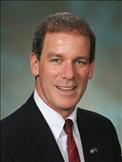
Roger Goodman
Many overdose deaths occur because friends of the victim delay or completely avoid seeking medical treatment for fear they will end up being arrested themselves. That fear is one of the most significant barriers to getting help for OD victims.
The bill would prevent Good Samaritans from being prosecuted for drug possession, but not drug manufacture or distribution offenses. The bill also provides the same immunities for drug overdose victims. A second section of the bill legalizes the use of the opioid antagonist naloxone to treat overdoses.
Before becoming an elected official, Goodman earned an impressive reputation in the drug law reform community and the legal community as head of the King County Bar Association Drug Policy Project. Now, he has moved from advocating change to legislating change.
The bill was introduced January 29 and passed the House Committee on Public Safety and Emergency Preparedness on February 18 in amended version. On Thursday, it was returned to the Rules Committee for a second reading.
Update: HB 1796, and its companion bill sponsored by Sen. Rosa Franklin, SB 5516, did not come up for a vote before Thursday's cutoff.
back to top
March 18, 1839: Lin Tse-Hsu, the imperial Chinese commissioner in charge of suppressing the opium traffic, orders all foreign traders to surrender their opium. In response, the British send expeditionary warships to the coast of China, initiating the First Opium War.
March 14, 1937: Setting a judicial precedent important to drug policy, the US Supreme Court rules that machine guns can be controlled by first taxing them, then using the tax act to prohibit them. One month later Harry Anslinger, head of the Federal Bureau of Narcotics, introduces the Marijuana Tax Act to Congress.
March 19, 1983: Best known for her role in Just Say No, First Lady Nancy Reagan appears on the NBC sitcom Diff'rent Strokes, declaring: "Let me tell you a true story about a boy we'll call Charlie. He was only 14 and he was burned out on marijuana... One day, when his little sister wouldn't steal some money for him to go and buy some more drugs, he brutally beat her. The real truth is there's no such thing as soft drugs and hard drugs. All drugs are dumb... Don't end up another Charlie."
March 17, 1999: A report by the Institute of Medicine for the Office of National Drug Control Policy states that "there is no conclusive evidence that the drug effects of marijuana are causally linked to the subsequent abuse of other illicit drugs" and "scientific data indicate the potential therapeutic values of cannabinoid drugs for pain relief, control of nausea and vomiting, and appetite stimulation."
March 16, 2000: Patrick Dorismond, an unarmed security guard, is shot and killed by undercover New York City police officers who had unsuccessfully tried to sell him marijuana in a "buy-and-bust" operation. [The shooting was the third time in 13 months that New York City police officers dressed in plainclothes shot and killed an unarmed black man. Under Mayor Rudolph Giuliani, marijuana arrests rose from 720 in 1992, to 59,945 in the first eleven months of 2000.]
March 19, 2001: Mexican President Vicente Fox is quoted in the Associated Press: "[T]he day that the alternative of freeing the consumption of drugs from punishment comes, it will have to be done in the entire world because we are not going to win anything if Mexico does it, but the production and traffic of the drugs... to the United States continues. Thus, humanity will one day view it [legalization] as the best in this sense."
back to top
Along with our weekly in-depth Chronicle reporting, DRCNet also provides daily content in the way of blogging in the Stop the Drug War Speakeasy -- huge numbers of people have been reading it recently -- as well as Latest News links (upper right-hand corner of most web pages), event listings (lower right-hand corner) and other info. Check out DRCNet every day to stay on top of the drug reform game! Check out the Speakeasy main page at http://stopthedrugwar.org/speakeasy.

prohibition-era beer raid, Washington, DC (Library of Congress)
Since last issue:
Scott Morgan offers: "New Drug Czar Appointed, Makes Ridiculous Remark," "Ten Years Later, the United Nations Anti-Drug Efforts Have Accomplished Nothing," "NBC Insults Marijuana Users," "Propaganda Alert: Marijuana Makes You Bad at Video Games," "Are Republicans Turning Against the Drug War?," "Federal Prosecutors Seem Confused About Obama's Medical Marijuana Policy," and "Why Are Democrats Barking About Rush Limbaugh's Drug Use?"
Prof. Douglas Young of Gainesville College guest blogs: "Contemplating Marijuana Legalization."
David Borden reposts: "Police Officer in Cowboy Hat Talks Drug Legalization on Al Jazeera" and "Drug Policy Reform Video and Poster Contest Winners Announced."
David Guard posts numerous press releases, action alerts and other organizational announcements in the In the Trenches blog.
Please join us in the Reader Blogs too.
Again, http://stopthedrugwar.org/speakeasy is the online place to stay in the loop for the fight to stop the war on drugs. Thanks for reading, and writing...
back to top
Want to help end the "war on drugs," while earning college credit too? Apply for a StoptheDrugWar.org (DRCNet) internship for this spring or summer semester and you could come join the team and help us fight the fight!
StoptheDrugWar has a strong record of providing substantive work experience to our interns -- you won't spend the summer doing filing or running errands, you will play an integral role in one or more of our exciting programs. Options for work you can do with us include coalition outreach as part of the campaign to rein in the use of SWAT teams, to expand our work to repeal the drug provision of the Higher Education Act to encompass other bad drug laws like the similar provisions in welfare and public housing law; blogosphere/web outreach; media research and outreach; web site work (research, writing, technical); possibly other areas. If you are chosen for an internship, we will strive to match your interests and abilities to whichever area is the best fit for you.
While our internships are unpaid, we will reimburse you for metro fare, and DRCNet is a fun and rewarding place to work. To apply, please send your resume to David Guard at [email protected], and feel free to contact us at (202) 293-8340. We hope to hear from you! Check out our web site at http://stopthedrugwar.org to learn more about our organization.
back to top
Students for Sensible Drug Policy, a grassroots political advocacy organization with a member network of thousands and a national staff of six, is seeking a highly motivated, well-organized individual to help promote alternatives to the failed War on Drugs. This is a full- time, entry-level position that is ideal for a person with prior student organizing experience.
SSDP currently employs two outreach directors. Due to growing demand for advocacy, SSDP is hiring a third outreach director, who will be based in San Francisco, CA or Washington, DC. Interested individuals may apply for the position in either location. The application deadline is Friday, April 3. Although the intention is to fill the position starting in April, graduating seniors will be considered. If you cannot start full-time before May or June, SSDP will consider starting the position on a part-time basis prior to graduation.
Duties of the outreach director include:
1) Assisting students who wish to start SSDP chapters: The outreach director receives several chapter startup inquiries each day. He/she promptly responds to each inquiry and guides the student through the process of establishing a chapter on campus. The outreach director is also responsible for the development of trainings and materials that will benefit students working to start new chapters. Information on new chapter progress is tracked using database software.
2) Proactive recruitment: The outreach director proactively recruits new students to start chapters by tabling at schools, concerts, conferences and other events. He/she is sometimes asked to travel for a week or more to a specific state or region with the goal of identifying students interested in drug policy reform.
3) Providing campaign support to established chapters: The outreach director works with the associate director on developing materials and the execution of grassroots campaigns. The associate director takes the lead on creating resources for campaigns, while the outreach director works with new and inexperienced chapters on implementation.
4) Event planning: The outreach director coordinates events that require many different components (e.g. outreach, logistics, materials, etc). These events include international and regional conferences, small fundraising events, campaign rallies, and demonstrations.
The outreach director is trained and supervised by the associate director, and reports directly to the executive director.
Qualifications include a passion for getting young people involved in the political process; exceptional interpersonal skills, particularly when meeting new people; the ability to communicate orally with comfort and conviction, particularly over the phone; succinct, persuasive, inspiring writing, plus a close attention to detail; comfort with working nontraditional hours (occasional nights and weekends), as this is when students are most available; a desire to travel, and the ability to work well away from the office; experience working with and managing volunteers; and a firm belief that students will play a key role in ending the War on Drugs.
Qualities/abilities that are valuable, but not necessary, include a demonstrated dedication to drug policy reform; experience with student organizing & activism; and a working knowledge of Apple products, Microsoft Excel, and Facebook.
To apply, interested applicants should e-mail a one-page cover letter and one- or two-page resume to Executive Director Kris Krane at [email protected]. In your cover letter, please indicate (1) how you learned about SSDP's job opening, (2) why you are interested in working with SSDP, (3) why you think this particular position is a good fit for you, (4) what experience you have in student organizing or drug policy reform work and (5) which of our offices you are interested in working from (San Francisco, CA or Washington, DC) and if your desired location is flexible. Feel free to include any additional information you deem relevant, not to exceed one page.
Salary is $28,000-$32,000, commensurate with experience. Benefits include health care and the satisfaction that comes along with changing the world for the better.
Students for Sensible Drug Policy is an equal opportunity employer. SSDP has a strong commitment to diversity and, as such, women, people of color, LGBT individuals, and individuals who have been directly affected by the Drug War are encouraged to apply.
If you submit a cover letter and resume, SSDP will respond to you within two weeks with either a request for additional documentation, or notification that your application is being considered.
Please visit http://www.SchoolsNotPrisons.com for more information about SSDP's mission and campaigns.
back to top
Do you read Drug War Chronicle? If so, we'd like to hear from you. DRCNet needs two things:
- We are in between newsletter grants, and that makes our need for donations more pressing. Drug War Chronicle is free to read but not to produce! Click here to make a donation by credit card or PayPal, or to print out a form to send in by mail.
- Please send quotes and reports on how you put our flow of information to work, for use in upcoming grant proposals and letters to funders or potential funders. Do you use DRCNet as a source for public speaking? For letters to the editor? Helping you talk to friends or associates about the issue? Research? For your own edification? Have you changed your mind about any aspects of drug policy since subscribing, or inspired you to get involved in the cause? Do you reprint or repost portions of our bulletins on other lists or in other newsletters? Do you have any criticisms or complaints, or suggestions? We want to hear those too. Please send your response -- one or two sentences would be fine; more is great, too -- email [email protected] or reply to a Chronicle email or use our online comment form. Please let us know if we may reprint your comments, and if so, if we may include your name or if you wish to remain anonymous. IMPORTANT: Even if you have given us this kind of feedback before, we could use your updated feedback now too -- we need to hear from you!
Again, please help us keep Drug War Chronicle alive at this important time! Click here to make a donation online, or send your check or money order to: DRCNet, P.O. Box 18402, Washington, DC 20036. Make your check payable to DRCNet Foundation to make a tax-deductible donation for Drug War Chronicle -- remember if you select one of our member premium gifts that will reduce the portion of your donation that is tax-deductible -- or make a non-deductible donation for our lobbying work -- online or check payable to Drug Reform Coordination Network, same address. We can also accept contributions of stock -- email [email protected] for the necessary info.
back to top













